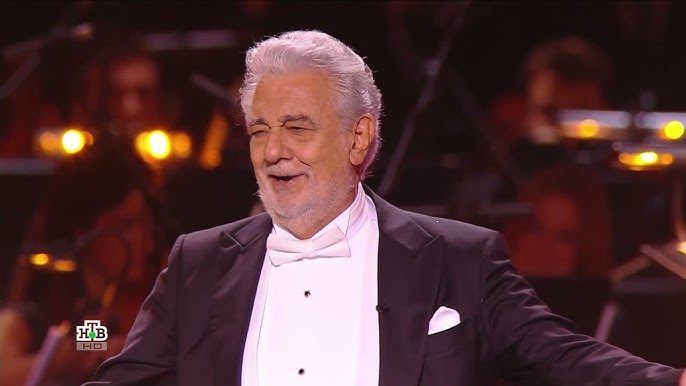Plácido Domingo and the Eternal Fire of “Granada” by Agustín Lara
Few songs carry the same volcanic intensity, the same fiery passion, and the same indomitable pride as “Granada.” Composed by Mexican songwriter Agustín Lara in 1932, the piece has long been a love letter to Spain, and in particular to the city of Granada, where Moorish palaces, flamenco rhythms, and the perfume of Andalusian nights converge. Over the decades, countless tenors have attempted to bring the piece to life. But when Plácido Domingo sings “Granada,” it becomes something else entirely — a force of nature, a storm of sound and spirit, a performance that fuses art, history, and raw emotion into one unforgettable moment.

A SONG BORN OF PASSION
Agustín Lara wrote “Granada” without ever having set foot in the Spanish city. Yet his imagination painted such vivid images of its hills, its bullfighters, its blood-red sunsets, and its Moorish courtyards that the song feels like a travel diary written in music. The lyrics invoke Granada as a land of dreams, where gypsies dance, guitars weep, and the air itself is alive with desire.
For most singers, the challenge of “Granada” is to honor that imagery while navigating its wide range and operatic power. It is not simply a popular song; it is a hymn of grandeur. The climactic high notes demand not only vocal technique but also a kind of heroic presence. Few can embody that better than Domingo.
DOMINGO’S VOICE AS A LIVING LANDSCAPE
Plácido Domingo was born in Madrid but raised in Mexico, a man whose artistic life bridges the two worlds that gave birth to “Granada.” When he sings this song, his heritage becomes inseparable from the music itself. His voice, rich with baritone warmth yet soaring with tenor brilliance, has the unique ability to make listeners feel as though the mountains of the Sierra Nevada rise before their eyes.
The opening lines, delivered softly, are almost intimate — as if Domingo were whispering a secret of the city to a lover. Then the voice grows, swelling with pride, until it becomes a roar, commanding the orchestra and carrying the imagery of Granada’s fire across the hall. The colors of his singing are remarkable: velvet smoothness in the low registers, golden sunlight in the middle, and blazing steel in the climactic high notes.

THE ORCHESTRAL DANCE
To hear Domingo sing “Granada” is not only to hear a voice, but to witness a dialogue between man and orchestra. The castanets click, the trumpets cry out, the strings pulse like the heartbeat of flamenco dancers, and the guitars strum in rhythmic counterpoint. Domingo rides this wave like a matador in the arena, fearless and commanding. His phrasing respects Lara’s Spanish inflections, rolling the “r” sounds with crisp energy, giving the words “tierra soñada por mí” (“land dreamed of by me”) a personal, almost mystical weight.
At moments, the orchestra swells so intensely that a lesser singer might be buried beneath it. Domingo never is. His sound cuts through, not by force alone, but by the sheer brilliance of placement and resonance. It is as if his voice becomes another instrument, yet one that dominates the symphony with human warmth.
THE CLIMAX OF FIRE
The final section of “Granada” is among the most thrilling in the repertoire of Spanish song. The melody soars upward, demanding a high note that can either crown the performance in triumph or bring it crashing down in failure. For Domingo, it is the moment of absolute glory.
He leans into the line with fearless energy, shaping the vowels into a blaze of sound. The high notes ring out like trumpets announcing the dawn. When he reaches the ultimate “Granada,” it is no longer merely the name of a city. It becomes a cry of love, a declaration of pride, a universal anthem of belonging. Audiences cannot help but erupt into applause, often before the final note has even faded.
A LEGACY OF PERFORMANCES
Domingo has sung “Granada” in opera houses, concert halls, and open-air stages across the world. Each time, it becomes a signature moment, a link between Spain and Mexico, between classical opera and popular song. In recordings from the 1970s, his youthful power gives the piece a raw, electrifying quality. In later years, with a voice matured and darkened, he brings even greater depth, interpreting the song not just as a showpiece but as a hymn of memory and longing.
No matter the setting, Domingo’s “Granada” always carries the authenticity of a man who knows both the cultural roots and the universal power of the piece. Critics often note that while many tenors can sing the notes, few can summon the full spirit of the song. Domingo does — with every breath.

WHY IT ENDURES
Why has “Granada” remained so beloved, and why does Domingo’s interpretation stand above so many others? Perhaps it is because the song speaks to something larger than music: the idea of identity, of belonging to a place of beauty and fire. For Spanish audiences, it is a hymn of homeland pride. For Latin American audiences, it is a bridge to ancestral memory. For international listeners, it is an invitation to enter a world of passion and romance.
Domingo amplifies all of these layers. He is not merely singing notes on a page; he is embodying a cultural soul. Each phrase feels as though it carries centuries of Moorish history, the colors of flamenco skirts, the dust of bullrings, and the perfume of orange blossoms carried by Andalusian breezes.
THE ETERNAL GRANADA
When the last chord of “Granada” dies away under Domingo’s command, there is always a silence before the applause — the kind of silence that comes when an audience has been stunned, transported, even overwhelmed. In that silence, one realizes that Agustín Lara’s dream of Granada has become real, tangible, alive in the air of the concert hall.
Plácido Domingo, with his voice of bronze and fire, does not merely perform “Granada.” He resurrects it, he crowns it, he makes it eternal. For anyone who has heard him sing it, the city will never again be just a place on a map. It will always be that land of dreams, painted forever in music.




